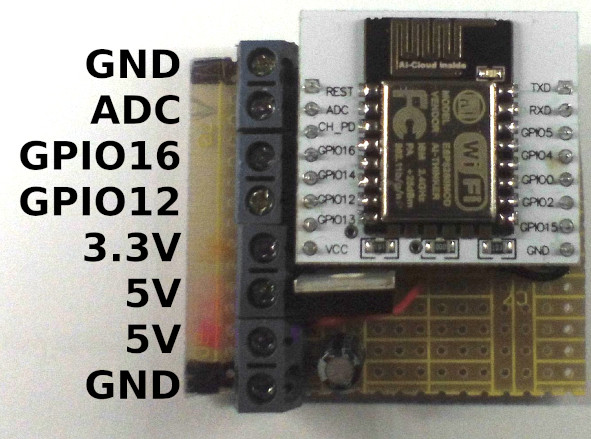Difference between revisions of "Spacestate sensors"
(added category) |
(set project to stalled: inactive since nov 2014; see SpaceAPI for updates) |
||
| Line 1: | Line 1: | ||
{{Project | {{Project | ||
| − | |State= | + | |State=Stalled |
|Members=Xopr | |Members=Xopr | ||
|Description=You can't manage what you don't measure | |Description=You can't manage what you don't measure | ||
}} | }} | ||
| − | |||
Note: Onewire sensors are part of the [[ESP8266-SpaceState]] ([[SpaceAPI]]). | Note: Onewire sensors are part of the [[ESP8266-SpaceState]] ([[SpaceAPI]]). | ||
Some code is already in place, and using [[ESP8266]] wifi modules make it very modular. | Some code is already in place, and using [[ESP8266]] wifi modules make it very modular. | ||
Revision as of 12:22, 3 November 2015
| Project: Spacestate sensors | |
|---|---|
| Featured: | |
| State | Stalled |
| Members | Xopr |
| GitHub | No GitHub project defined. Add your project here. |
| Description | You can't manage what you don't measure |
| Picture | |

| |
Note: Onewire sensors are part of the ESP8266-SpaceState (SpaceAPI). Some code is already in place, and using ESP8266 wifi modules make it very modular.
Contents
synopsis
Create a 1-wire network of sensors to keep an eye on temperatures (and/or other stuff), especially for monitoring the server room, and optionally, the [sl|h|st]ackspace(s), probably including the space state switch and the keychain patch rack (sensing keys)..
intro
After implementing the Space state switch, a Spacestate indicator and its mobile implementation, it is time to add some extra's to the SpaceAPI, namely: a sensor network.
The idea got triggered due to the fact that sensors are natively supported in the SpaceAPI, and our server room tends to get fairly warm in the summer.
The plan is to start off with an Arduino + netshield, and later design a small custom PCB with AVR + W5100ENC28J60/WIZ811MJ
implementation
Current space RJ45 connector pinput wired to the Raspberry Pi (P-CarPi):
Data2GNDGNDData2- NC
- VCC
- NC
- NC
- Data1
- GND
On the Raspi, changed the following: in /etc/modules, add w1-gpio and w1-therm on separate lines.
The pins used: 1 (3v3), 7 (Data1), 9 (GND), 11 (Data2)
After the modules have been loaded, you can see the sensors in the /sys/bus/w1/devices/ directory.
testing
- I (Xopr) modified an RJ45 coupler to have a sensor connected to pins 8, 7 and 4 (Ground, data and Vcc respectively), and while it worked for one night, it became more and more unstable up until the point that it only worked with a 25cm cat5e patchcable.
- Tested with 25cm 3m and 10m on a 4k7 pull up: worked perfectly! Next test was with a 25m (not sure actually), and an 85m cable, but using a 1k pullup: worked flawlessly for days!
- Tested on Raspi (3v3) with the w1- modules: worked like a charm.
todo
- Make a level shifter so that the system can work with 5v